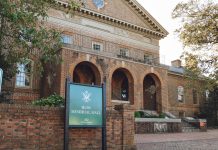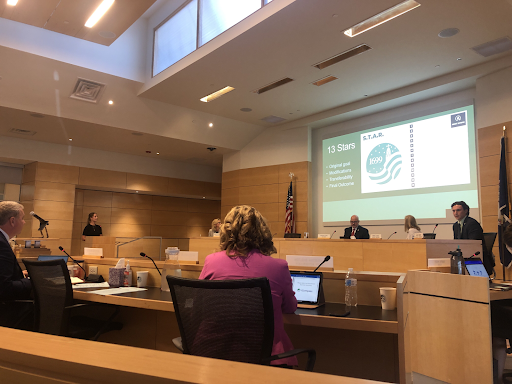The following article was previously published on The Flat Hat’s website. However, due to an unforeseen technological glitch, it was removed from the website for a period of time and was re-uploaded today, Nov. 6.
Monday, Sept. 11, Sophie Workinger ’24 presented her report and recommendations on sustainability improvements to the Williamsburg City Council at the Williamsburg Stryker Center.
“One of the Goals, Initiatives and Outcomes for Williamsburg this year has been courageously leading, and under that is a subheading of carbon emissions reduction,” Workinger said.
Through the College of William and Mary’s Roy R. Charles Center, Workinger worked as a Carbon Emissions Reduction Project intern through the City Manager’s Office. As a result of her efforts, Workinger developed a “13 STARS” plan. STAR stands for Strategic Targeted Action for Reduction.
“The goal here was to make it available to any city, they can sort of choose how much they want to reduce their emissions by,” Workinger said. “For example if you want to reduce your emissions by 25%, then each of the stars that you would get would be equivalent to around 2.1% of your annual emissions.”
Workinger’s presentation offered a broad menu of 12 actionable items that she believes will help reduce carbon emissions. She deemed six of these actions as top initiatives: plastic bag tax, city composting, complete streets, city solar, electric lawn equipment and electric fleet.
According to her plan, Workinger believes the city should implement a $0.05 tax on disposable plastic bags within city limits, with the tax revenue going towards environmental education, reusable bags and other initiatives. Workinger also supports the creation of a public drop-off location for compost and the promotion of active forms of transportation such as cycling and walking.
Workinger detailed other parts of her plan, noting that initial steps to this process are crucial.
“Electric lawn equipment is sort of funny, as you can imagine it is very public,” Workinger said. “Phasing out the gas-powered equipment and instead using electric equipment could be one alternative to just start the movement.”
According to her presentation, some initiatives will save money for the City in the long run. Installing solar panels on city buildings like the Quarterpath Recreation Center, for example, would save the City $76,000 over 20 years and reduce emissions by 48.2 metric tons.
“You can see that there is overall cost savings by switching to electric,” Workinger said “The goal here was to find electric equivalents to cars already used in the city so that it’s an easier change.”
Workinger also supports the transition of municipal fleets to electric vehicles. She pointed to a case study in which the New York City Police Department switched to electric vehicles and now saves 700 gallons of gas per year per vehicle.
“You can see that there is overall cost savings by switching to electric,” Workinger said “The goal here was to find electric equivalents to cars already used in the city so that it’s an easier change.”
Workinger concluded the presentation by suggesting possible next steps for the Council, which are: “Make an Emissions Reduction Goal, Make a Climate Action Plan, Start Small But Start Somewhere, Environmental Website and Utilize W&M Student Energy.”
Williamsburg Mayor Doug Pons and Councilmember Caleb Rogers ’20 thanked Workinger and reiterated the need for action.
“Certainly a lot to do in order to become 100% carbon free by 2050, which is right around the corner,” Pons said.
Councilmember Barbara Ramsey ’75 appreciated Workinger’s presentation.
“I particularly like the fact that you talk about taking a small step first because, I think, sometimes, to your point, we get overwhelmed thinking, the gargantuan methods that could be employed,” Ramsey said.
Associate Director of the Charles Center Ted Maris-Wolf Ph.D. ’11, who attended the council meeting, also praised Workinger’s presentation.
“Our students not only care about global issues like the effects of carbon emissions on our environment, but how such issues impact local residents and the future of our shared community,” Maris-Wolf wrote in an email to The Flat Hat. “Through her remarkable research, robust written report, and polished presentation to City Council, Sophie demonstrated how much William & Mary undergraduates have to offer the community—as thought partners, leaders, and fellow Williamsburg residents who care about the quality and sustainability of life here.”
He further detailed the Charles Center’s efforts to advance internship opportunities for students at the College.
“Over the past year, the Charles Center has been collaborating with campus partners to create exciting opportunities for students to receive academic credit for experiences that include paid summer internships,” Maris-Wolf wrote. “The Charles Center offers a number of paid summer internships for undergraduates, including opportunities in the competitive fields of museum studies, nonprofit management and journalism.”
suggestions.
“I really hope that the City Council is actually able to put some of the policy suggestions in effect, because I know that it can be really easy to see what needs to be done, but it can be really hard to actually put it in action,” Berg said. “ I sort of just hope that I know the people we voted for do what they say they will.”
Members of the Citizens Climate Lobby at the College attended Workinger’s presentation to show their support at the council meeting, including giving public comments. CCL Vice President Helen Tiffin ’26 said she hopes obstacles do not prevent the council from taking action.
“It was amazing. I did find, [electric] Fords to be a little discouraging when thinking about the mountain of climate work that does need to be done. “But, little steps, don’t let the perfect be the enemy of the good. That’s better than doing nothing. So there’s still work to be done, but this is a good start,” Tiffin said.
CCL member Justin Berg ’24 hopes the Council takes action and does not sidestep Workinger’s suggestions.
“I really hope that the City Council is actually able to put some of the policy suggestions in effect, because I know that it can be really easy to see what needs to be done, but it can be really hard to actually put it in action,” Berg said. “ I sort of just hope that I know the people we voted for do what they say they will.”
CCL President Corina Chang ’25 echoed Berg’s sentiments.
“I hope the Council members and the Mayor and everyone doesn’t view this as just sort of a side project or a student project that we’re doing for credit or something to put on our resumes,” Chang said. “I hope they take it in the presence of all the students that came to the meeting as something that we actually care about deeply that’s not just related to school, but deeply affects our future and the future of everyone else on this planet.”






































